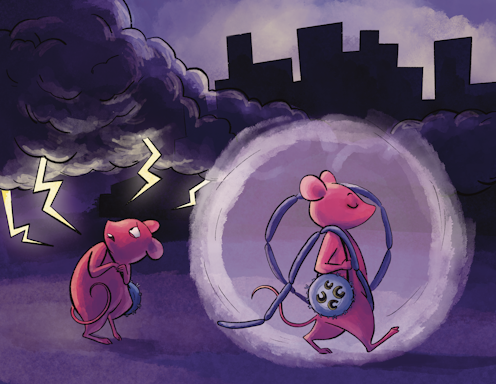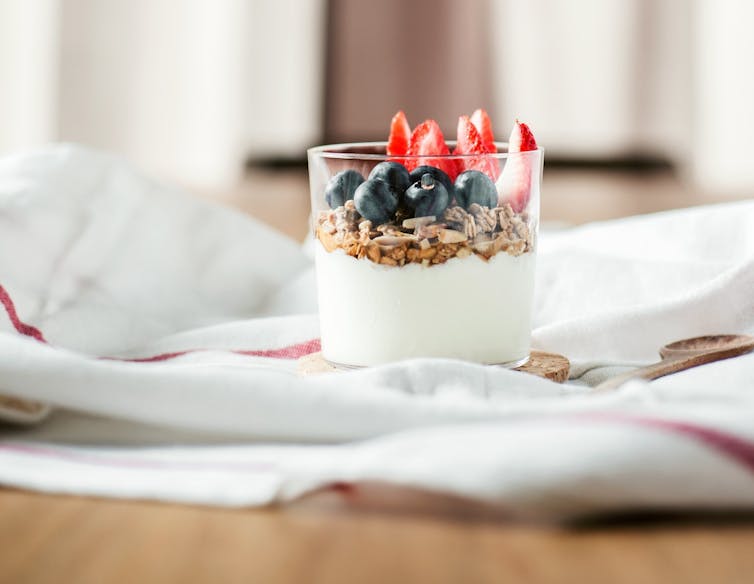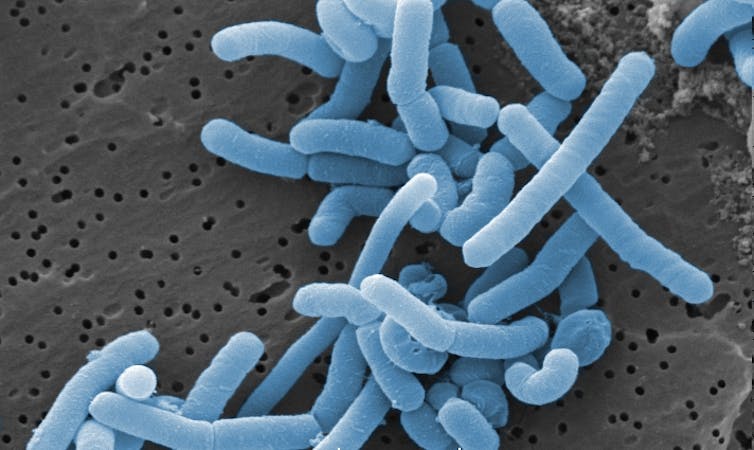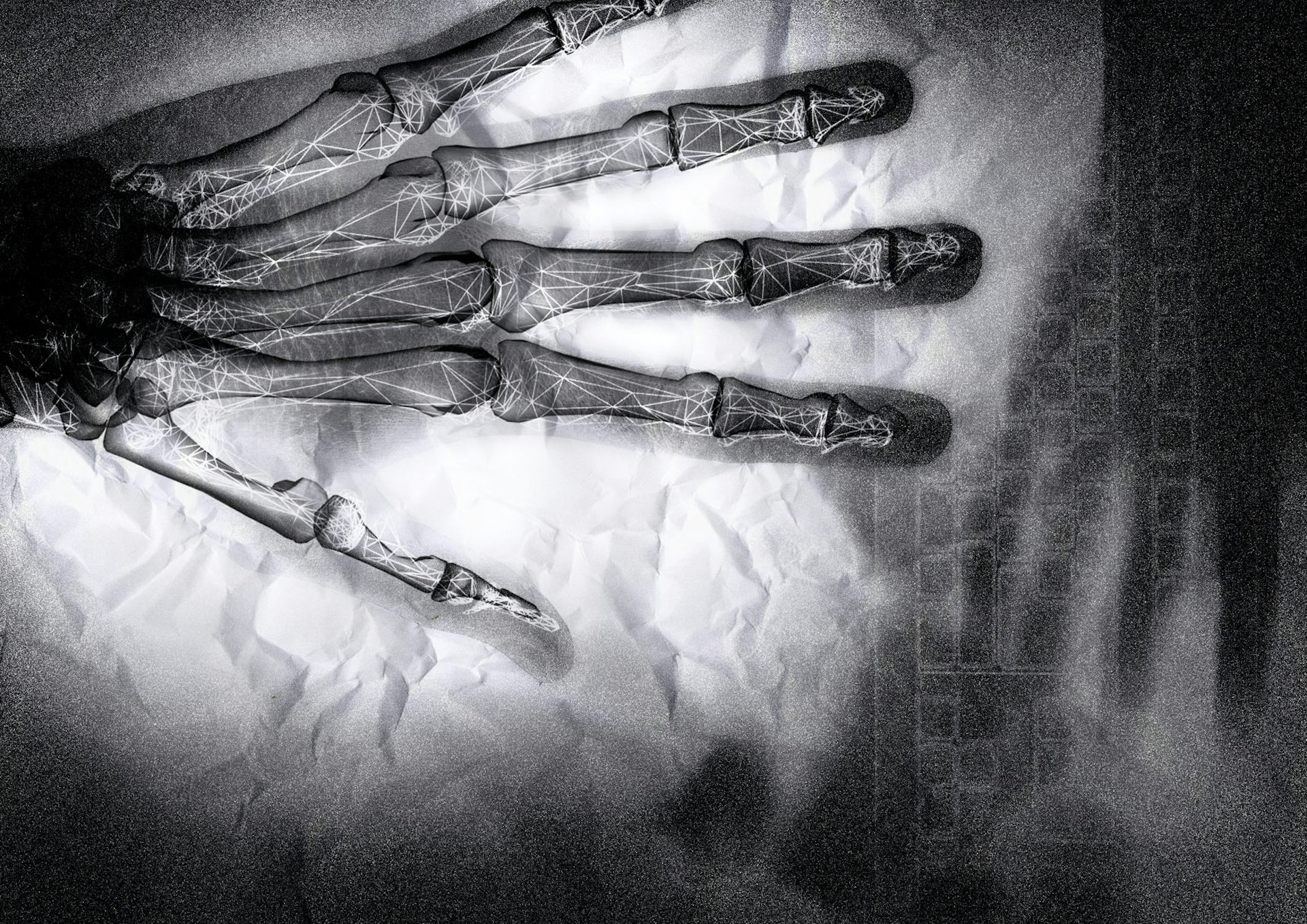Bacteria in your gut can improve your mood − new research in mice tries to zero in on the crucial st
The organisms living in your gut microbiome can influence your mental and physical health. Researchers have developed a way to better test for those biological effects.

Probiotics have been getting a lot of attention recently. These bacteria, which you can consume from fermented foods, yogurt or even pills, are linked to a number of health and wellness benefits, including reducing gastrointestinal distress, urinary tract infections and eczema. But can they improve your mood, too?
Behavior and mental health are complicated. But the short answer, according to my team’s recently published research, is likely yes.
The beneficial bacteria in probiotics become part of a community of other microscopic organisms living in your digestive system called the gut microbiome. Your gut microbiome contains trillions of a diverse range of bacteria, fungi and viruses.
Hundreds of species of bacteria are native to the intestinal tract. Each species can be broken down into hundreds of strains that can also be dramatically different from each other in their metabolism, byproducts and environmental preferences.
This bacterial diversity is why not all probiotics are built the same. Many research groups have shown that specific strains of Lactobacillus have mood-enhancing effects.
But these effects seem to happen only with the right mix of bacteria in the right conditions. For example, a probiotic that can reduce symptoms of stress in someone who is worried about their calculus final may not work in someone with symptoms of post-traumatic stress disorder.

Studying mood in mice
In my work as a neuroscientist, I study how the gut influences the brain. My team and I recently conducted experiments in mice that support the idea that gut microbiota play a role in regulating stress.
So how do you measure the mood of mice?
First, we needed to understand how stressed mice behave. So we placed them under short periods of stress: They are restrained for two hours each day, given enough room to move around but not enough to groom or stand up. We envision this as the same type of stress people experience when they’re confined to a car or cubical for hours at a time.
Stressed mice soon exhibited depression- and anxiety-like behaviors, which we measured by monitoring how much time they spent hiding when placed in a new environment or how quickly they try to right themselves when flipped upside down.
While it isn’t surprising that stressed mice hide longer and are slower to right themselves, the power of their poop to change their behavior was.
To see if stressed behavior could be transferred through the microbiome, we used another group of mice that were entirely clean. These mice were free from any bacteria, fungi or viruses and lived in a rubber bubble. They essentially had no microbiome at all.
We exposed them to poop from either stressed mice or normal mice by sprinkling soiled bedding in their enclosures. Microbes from the donor mice started to populate the gut microbiomes of the clean mice.
Within a few weeks, the clean mice exposed to poop from stressed mice started to develop stress- and anxiety-like behavior, even though nothing else had changed. Meanwhile, clean mice exposed to poop from normal mice had no differences in their behavior. This finding suggests that the microbes in poop changed the mice’s behavior.
Which bacteria affect mood?
The results of our experiments led us back to our original question: Which bacteria can change your mood?
We started by comparing the microbes in the poop of stressed and normal mice. In our analysis, we found that a group of bacteria called Lactobacillus was greatly reduced in the stressed mice. Research has linked this group of bacteria to stress reduction before. However, Lactobacillus contains over 170 different species and even more strains.
Currently, the probiotic supplements available to patients are unregulated and often untested. In order to reliably get the most effective strains to patients, they need to be properly tested. So we had to come up with a way to test how different strains affect anxious behavior.

Instead of tackling this colossal task alone, we created a method that other microbiome scientists can also use to look at this group of bacteria as systematically as possible.
To recreate the same experimental conditions for each species of microbe, we created a group of mice with only six species of bacteria in their microbiome, the bare minimum needed for normal and healthy development, which did not include Lactobacillus. This way, we could add individual strains of Lactobacillus back into the mice’s gut microbiome and observe the effects of each strain on their behavior and biology.
We’ve tested two strains so far: Lactobacillus intestinalis ASF360 and Lactobacillus murinus ASF361. Mice with these two strains of Lactobacillus are more resilient to stress and have quieted neural pathways associated with fear.
What’s next?
Our study on how different strains of Lactobacillus affect mood is just the beginning. We hope that our research will open avenues for other scientists to test different probiotics.
While researchers are reaching a consensus that the bacteria in your digestive tract can influence your mood, and vice versa, there is still a lot of testing to be done in both animals and in people.
Our team is starting to develop ways to systematically test which bacteria may provide the best health outcomes in people and which probiotics are the most effective. In the meantime, give the Lactobacillus in your gut some love through a healthy, probiotics-rich diet.
Andrea Merchak has received funding from the National Institutes of Health (T32 NS115657, F31 AI174782).
Read These Next
Why does pain last longer for women? Immune cells may be the culprit
Your immune systems kicks into gear when you’re injured, both worsening and relieving pain.
Why ICE’s body camera policies make the videos unlikely to improve accountability and transparency
For body cameras to function as transparency tools, wrongdoing would have to be consistently penalized,…
Artists and writers are often hesitant to disclose they’ve collaborated with AI – and those fears ma
Whether they’re famous composers or first-year art students, creators experience reputational costs…






